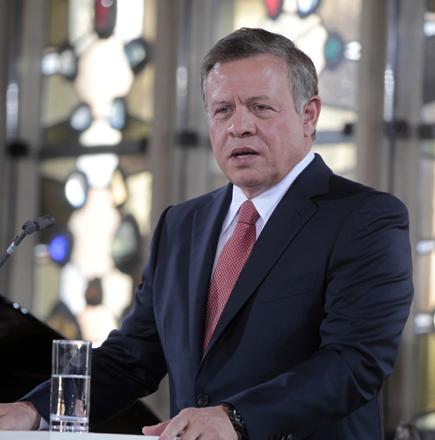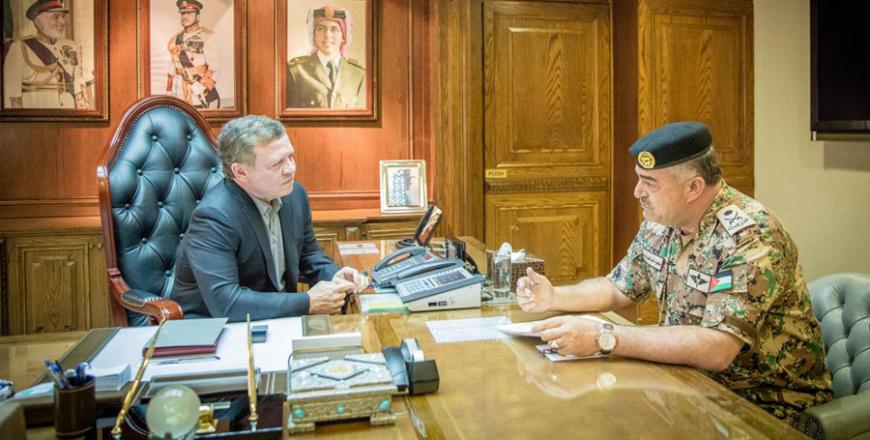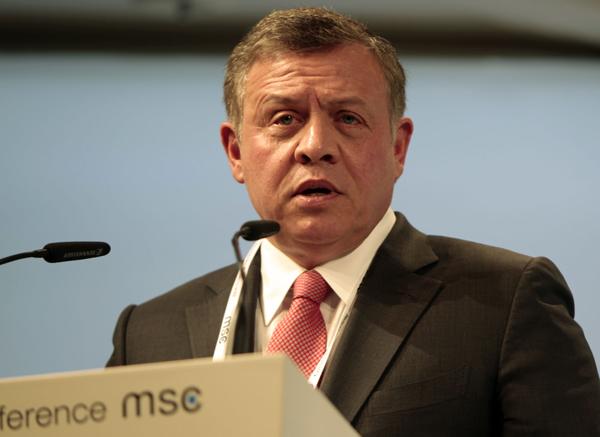You are here
‘Investing in Jordan is in reality a much larger investment in stability, resilience and hope’
Oct 08,2016 - Last updated at Oct 08,2016

Photo courtesy of Royal Court
Following is the full text of His Majesty King Abdullah’s speech at the Peace of Westphalia Prize ceremony in Munster, Germany, on Saturday:
In the Name of God, the Most Merciful, the Most Compassionate,
Mr President,
Mr Chairman,
Most Distinguished Hosts and Friends:
Vielen Dank. My warmest thanks to the people of this historic city of Münster, and to all the people of Germany. I greatly appreciate the kindness of the Economic Society [of Westphalia and Lippe] for generously joining my name to the world leaders who have received this honour.
And I am delighted, too, that the Economic Society always includes a youth group as co-recipient of this prize. We have all heard it said that the future of world peace is in the hands of our young people. In fact, the world's peace is already in the hands of young people — in Germany, in Jordan, and beyond, so congratulations to all of you today. We need to welcome and encourage their participation in positive global life. I congratulate these young men and women, and you who honour them. And I hope to be able to welcome some of you to Jordan in the near future.
My friends,
German leadership was vital to the 17th-century Peace of Westphalia, which we pay tribute to, in the name of this prize. But Germany's commitment to peace and tolerance is just as vital, perhaps even more vital, in meeting the challenges of our own 21st century. Many of you have been instrumental in that effort. And I deeply admire the vision and courage of Chancellor Merkel, in the fight against terrorist evil and the human suffering it has caused. On behalf of myself and the Jordanian people, I would like to thank her and the leadership of Germany and the German people — without all of you the world would not be where we are today and we would be in a much worse position.
Today, if you will allow me, let me first ask: what can we learn from a treaty signed 368 years ago?
There has been a great deal written about the Peace of Westphalia, and its historic contribution to Europe and the world. It ended generations of brutal war, in which millions died — some estimate half the German population of that time. It was a unique achievement in European history that a major war was ended through negotiated, international diplomacy — helping re-shape the modern system. And by establishing religious tolerance — even though limited — it helped point the way to the interfaith acceptance on which humanity's future depends.
The treaty also required fresh thinking. There were influential voices urging the parties not to reconcile; not to put grievances aside; not to accept neighbours of a different path and a different faith. But the negotiators — at one time and another, I understand, more than 100 delegations — went a different way. They saw that their own interests would only be met when, together, they fulfilled a collective interest: in peace, cooperation and mutual respect.
The peace was not perfect. But the promise was there. We see it in the very first Article of the treaty... where each party pledges to work, with all "sincerity and zeal", for "the Benefit, Honour and Advantage" of the other side.
This collective interest is the Golden Commandment, expressed in all three of the monotheistic religions that had their roots in my region, Islam, Christianity and Judaism.
In the words of the Prophet Mohammad, may peace and blessings be upon him:
“God does not have mercy on someone who is not merciful towards other people.”
[Sahih Bukhari; Sahih Muslim]
My friends,
I see, unfortunately, too often, among Western officials and opinion leaders, a dangerous lack of understanding of the true nature of Islam. Extremists — on all sides — use that lack of knowledge to polarise societies and drive us apart. Far from benefiting a country or community, this division harms us all.
Imagine what the future would look like if we don't take a stand for each other.
If we ignore distant violence and poverty, as if it has nothing to do with our lives, our countries, our economies?
If we close our eyes to the worst global refugee crisis in human history, and let a “lost generation”, millions of young people, come of age without hope?
If we let the future belong, not to law, but to outlaws: mass murder, persecution, the abuse of children, the enslavement of women, videoed executions of those who disagree?
No. To such a future, we must say no.
Today, collective action is essential to end the regional crises and vulnerabilities that terrorists exploit. Muslim-majority countries in the Balkans need to be integrated into an inclusive Europe, and supported in keeping the door shut against terrorist groups. They are your family, your frontline.
And where crises have divided people, a political process is essential to build the future. For Syria, our world must exert all its influence, to support a Syrian-led political process — one that engages all components of the Syrian people, upholds Syria's sovereignty and territorial integrity, ends suffering and brings hope.
On a larger scale, it is time to shift the emphasis to citizens, as the cornerstone of stability in my region.
We need a Peace and Stability Pact for the Levant — a pact that will encompass not only a code of conduct, but enhanced regional cooperation, and a regional fund for cohesion to address the serious socio-economic challenges our people face.
Such a pact would serve as a blueprint for a region at peace. It will help us deploy regional and global resources and energies effectively. It will foster inclusion, civic engagement and human dignity, within a forward-thinking coalition of regional nations.
My friends,
Jordan has consolidated significant economic reforms; and followed through with inclusive, political change. Last month, EU observers were present for our parliamentary elections, based on a new elections law. The largest segment of voters — more than 36 per cent — were young people under 30.
Yet as Jordan moves forward, my country is living with a refugee influx at crisis levels. Today we host 1.4 million Syrians fleeing the violence. The new influx has put unprecedented pressures on the essentials of life: jobs, energy, housing, even water. It is draining a quarter of our entire national budget. And this, is in addition to approximately 2 million Jordanians who are also Palestinian refugees registered for decades with UNRWA, and hundreds of thousands of Iraqi refugees and others from Libya and Yemen. This makes Jordan the biggest host of refugees in the world.
It is wrong for Jordanians to be asked to carry such a refugee burden.
The fact is, if regional host countries were unable to fulfil our roles, the refugee burden would not disappear. It would simply fall elsewhere. We are facing a global crisis that demands global, collective action, to share the burden and support host communities and refugees alike.
Investing in Jordan is in reality a much larger investment in stability, resilience and hope for those in my country but also for the region. Jordan's response to the refugee challenge emphasises sustainability: infrastructure, job creation, trade, investment and more. Getting kids in school and workers into jobs so that a prospering Jordan and post-conflict Syria can thrive. And here, let me thank Germany — and the German people — for all its important and tremendous support and the welcome role in this effort. We are truly grateful for everything your country has done for us. And we look forward to continuing our close partnership. Thank you, thank you, thank you.
My friends,
The Golden Commandment, to love our neighbour, guides our global responsibilities — and it must guide interfaith relationships as well. Nothing serves the interests of global terror groups, more than our fear and misunderstanding of each other.
Know that Daesh and its kind are outlaws of Islam we call khawarij. They manipulate and distort Islam's teachings to justify appalling acts, acts condemned by traditional Islam and Muslims everywhere. In the end these khawarij, the outlaws of Islam, are less than a drop in the ocean of good Muslim citizens, here and in every region.
Let us not be divided. Let us apply our own fresh thinking — as, today, we honour those who did so in the past — to build mutual respect, cooperation and peace.
Humanity is most strong, our values are most safe, when all people, of all faiths, share in the life and rights and hopes of their countries. When we do that, we create a future of peace for all humankind.
Thank you.
Related Articles
AMMAN — His Majesty King Abdullah on Saturday received the Peace of Westphalia Prize in recognition of his endeavours for peace and internat
AMMAN — His Majesty King Abdullah is scheduled to start a working visit to Germany on Friday, during which he will meet German President Joa
Following is the full text of His Majesty King Abdullah’s speech at the 52nd Munich Security Conference in Germany on Friday:In the name of


















